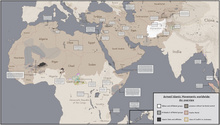Cihadçılıq
Cihadçılıq və ya cihadizm Qərb üçün ekzistensial olaraq təhdid kimi qəbul edilən militant islami hərəkatlar üçün istifadə olunan neologizmdir.[1] O, ideologiyaları islami cihad anlayışına əsaslanan müxtəlif qiyamçı İslam ekstremist, militant islamçı və terrorçu şəxslər və təşkilatlara tətbiq edilmişdir.[6] O, tarixdə cihad adı ilə qeyri-müsəlman xalqlara qarşı geniş kampaniya aparan Əməvilər Xilafəti və Osmanlı İmperiyası kimi müxtəlif İslam imperiyalarına da şamil edilmişdir.[7][8]

Müasir cihadçılığın kökləri daha çox XIX əsrin sonu-XX əsrin əvvəllərində və XX-XXI əsrlərdə Qutbilik və əlaqəli islamçı ideologiyalara çevrilən İslam dirçəlişinin ideoloji inkişafı ilə bağlıdır. [9][10] Cihadçı ideoloqlar cihadı müsəlman dünyasını “Allahın hökmü” altında birləşdirmək üçün dünyəvi beynəlxalq nizama qarşı “inqilabi mübarizə” kimi təsəvvür edirdilər. 1979-1989-cu illər Sovet-Əfqan müharibəsində iştirak edən islamçı könüllü təşkilatlar 1990-2000-ci illər ərzində müxtəlif silahlı münaqişələr zamanı təbliğ edilən cihadçılığın yüksəlişini gücləndirdi.
Gilles Kepel 1990-cı illərin Sələfi hərəkatı daxilində cihadçılığın xüsusi sələfi forması diaqnozu qoyub.[11] Beynəlxalq, panislamist miqyasda olan cihadçılıq qlobal cihadçılıq kimi də tanınır.[14] Araşdırmalar göstərir ki, İŞİD-n güclənməsi ilə həm Qərb ölkələrindən, həm də əksəriyyəti müsəlman olan ölkələrdən gələn bəzi müsəlman könüllülər Suriya və İraqdakı qlobal cihada qoşulmaq üçün gəliblər.[20]
İstinadlar
redaktə- ↑ Compare: Firestone, Reuven. "Jihadism" as a new religious movement // Hammer, Olav; Rothstein, Mikael (redaktorlar ). The Cambridge Companion to New Religious Movements. Cambridge: Cambridge University Press. 2012. 263–285. doi:10.1017/CCOL9780521196505.018. ISBN 978-0-521-19650-5. LCCN 2012015440.
'Jihadism' is a term that has been constructed in Western languages to describe militant Islamic movements that are perceived as existentially threatening to the West. Western media have tended to refer to Jihadism as a military movement which is rooted in political Islam. [...] 'Jihadism,' like the word jihad from which it is constructed, is a difficult term to precisely define. The meaning of Jihadism is a virtual moving target because it remains a recent neologism and no single, generally accepted meaning has been developed for it.
- ↑ 1 2 3 Atiyas-Lvovsky, Lorena; Azani, Eitan; Barak, Michael; Moghadam, Assaf. Cruickshank, Paul; Hummel, Kristina; Morgan, Caroline (redaktorlar ). "CTC-ICT Focus on Israel: In Word and Deed? Global Jihad and the Threat to Israel and the Jewish Community" (PDF). CTC Sentinel. West Point, New York: Combating Terrorism Center. 16 (9). 20 September 2023: 1–12. 20 September 2023 tarixində arxivləşdirilib (PDF). İstifadə tarixi: 1 October 2023.
- ↑ Poljarevic, Emin. Theology of Violence-oriented Takfirism as a Political Theory: The Case of the Islamic State in Iraq and Syria (ISIS) // Cusack, Carole M.; Upal, M. Afzal (redaktorlar ). Handbook of Islamic Sects and Movements. Brill Handbooks on Contemporary Religion. 21. Leiden and Boston: Brill Publishers. 2021. 485–512. doi:10.1163/9789004435544_026. ISBN 978-90-04-43554-4. ISSN 1874-6691.
- ↑ Badara, Mohamed; Nagata, Masaki. "Modern Extremist Groups and the Division of the World: A Critique from an Islamic Perspective". Arab Law Quarterly. Leiden: Brill Publishers. 31 (4). November 2017: 305–335. doi:10.1163/15730255-12314024. ISSN 1573-0255.
- ↑ Cook, David. Radical Islam and Contemporary Jihad Theory // Understanding Jihad (2nd). Berkeley: University of California Press. 2015 [2005]. 93–127. ISBN 9780520287327. JSTOR 10.1525/j.ctv1xxt55.10. LCCN 2015010201.
- ↑ [2][3][4][5]
- ↑ The End of the Jihad State. 2023-03-29 tarixində arxivləşdirilib. İstifadə tarixi: 2023-11-27.
- ↑ Mohanty, Nirode. Jihadism: Past and Present - Nirode Mohanty - Google Books. Rowman & Littlefield. 15 September 2018. ISBN 9781498575973. 2023-04-09 tarixində arxivləşdirilib. İstifadə tarixi: 2022-10-01.
- ↑ 1 2 Aydınlı, Ersel. The Jihadists after 9/11 // Violent Non-State Actors: From Anarchists to Jihadists. Routledge Studies on Challenges, Crises, and Dissent in World Politics (1st). London and New York: Routledge. 2018. 110–149. ISBN 978-1-315-56139-4. LCCN 2015050373. 2024-01-19 tarixində arxivləşdirilib. İstifadə tarixi: 2023-11-27.
- ↑ Jalal, Ayesha. Islam Subverted? Jihad as Terrorism // Partisans of Allah: Jihad in South Asia. Cambridge, Massachusetts: Harvard University Press. 2009. 239–301. doi:10.4159/9780674039070-007. ISBN 9780674039070.
- ↑ Kepel, Gilles. Jihad: The Trail of Political Islam. Bloomsbury Revelations (5th). London: Bloomsbury Academic. 2021. 219–222. ISBN 9781350148598. OCLC 1179546717.
- ↑ Meleagrou-Hitchens, Alexander; Hughes, Seamus; Clifford, Bennett. The Ideologues // Homegrown: ISIS in America (1st). London and New York: I.B. Tauris. 2021. 111–148. ISBN 978-1-7883-1485-5. 2023-01-11 tarixində arxivləşdirilib. İstifadə tarixi: 2023-11-27.
- ↑ Clarke, Colin. Cruickshank, Paul; Hummel, Kristina (redaktorlar ). "Twenty Years After 9/11: What Is the Future of the Global Jihadi Movement?" (PDF). CTC Sentinel. West Point, New York: Combating Terrorism Center. 14 (7). 8 September 2021: 91–105. 8 September 2021 tarixində arxivləşdirilib (PDF). İstifadə tarixi: 10 November 2021.
- ↑ [2][9][12][13]
- ↑ Milton, Daniel; Perlinger, Arie. Cruickshank, Paul; Hummel, Kristina (redaktorlar ). "From Cradle to Grave: The Lifecycle of Foreign Fighters in Iraq and Syria" (PDF). CTC Sentinel. West Point, New York: Combating Terrorism Center. 11 November 2016: 15–33. 18 June 2020 tarixində arxivləşdirilib (PDF). İstifadə tarixi: 20 December 2021.
- ↑ Schmid, Alex P.; Tinnes, Judith. "Foreign (Terrorist) Fighters with IS: A European Perspective" (PDF). ICCT Research Paper. The Hague: International Centre for Counter-Terrorism. 6 (8). December 2015. doi:10.19165/2015.1.08. ISSN 2468-0656. JSTOR resrep29430. 25 November 2020 tarixində arxivləşdirilib (PDF). İstifadə tarixi: 12 June 2021.
- ↑ Picker, Les. "Where Are ISIS's Foreign Fighters Coming From?". The Digest. 6 cild. Cambridge, Massachusetts: National Bureau of Economic Research. June 2016. 23 October 2020 tarixində arxivləşdirilib. İstifadə tarixi: 12 June 2021.
- ↑ Hekmatpour, Peyman; Burns, Thomas J. "Perception of Western governments' hostility to Islam among European Muslims before and after ISIS: the important roles of residential segregation and education". The British Journal of Sociology. Wiley-Blackwell for the London School of Economics. 70 (5). 2019: 2133–2165. doi:10.1111/1468-4446.12673. eISSN 1468-4446. ISSN 0007-1315. PMID 31004347.
- ↑ Pokalova, Elena. Foreign Fighters in Syria and Iraq: Aberration from History or History Repeated? // Returning Islamist Foreign Fighters: Threats and Challenges to the West. Basingstoke: Palgrave Macmillan. 2020. 11–58. doi:10.1007/978-3-030-31478-1. ISBN 978-3-030-31477-4.
- ↑ [2][15][16][17][18][19]